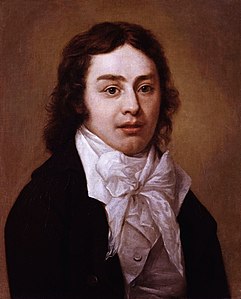Analysis of Kubla Khan
Samuel Taylor Coleridge 1772 (Ottery St Mary) – 1834 (Highgate)
In Xanadu did Kubla Khan
A stately pleasure-dome decree :
Where Alph, the sacred river, ran
Through caverns measureless to man
Down to a sunless sea.
So twice five miles of fertile ground
With walls and towers were girdled round :
And there were gardens bright with sinuous rills,
Where blossomed many an incense-bearing tree ;
And here were forests ancient as the hills,
Enfolding sunny spots of greenery.
But oh ! that deep romantic chasm which slanted
Down the green hill athwart a cedarn cover !
A savage place ! as holy and enchanted
As e'er beneath a waning moon was haunted
By woman wailing for her demon-lover !
And from this chasm, with ceaseless turmoil seething,
As if this earth in fast thick pants were breathing,
A mighty fountain momently was forced :
Amid whose swift half-intermitted burst
Huge fragments vaulted like rebounding hail,
Or chaffy grain beneath the thresher's flail :
And 'mid these dancing rocks at once and ever
It flung up momently the sacred river.
Five miles meandering with a mazy motion
Through wood and dale the sacred river ran,
Then reached the caverns measureless to man,
And sank in tumult to a lifeless ocean :
And 'mid this tumult Kubla heard from far
Ancestral voices prophesying war !
The shadow of the dome of pleasure
Floated midway on the waves ;
Where was heard the mingled measure
From the fountain and the caves.
It was a miracle of rare device,
A sunny pleasure-dome with caves of ice !
A damsel with a dulcimer
In a vision once I saw :
It was an Abyssinian maid,
And on her dulcimer she played,
Singing of Mount Abora.
Could I revive within me
Her symphony and song,
To such a deep delight 'twould win me,
That with music loud and long,
I would build that dome in air,
That sunny dome ! those caves of ice !
And all who heard should see them there,
And all should cry, Beware ! Beware !
His flashing eyes, his floating hair !
Weave a circle round him thrice,
And close your eyes with holy dread,
For he on honey-dew hath fed,
And drunk the milk of Paradise.
| Scheme | XABBACCDADA EFXEFGGXXHHFFIBBIXXFDFDDD FDJJAAKAKLDLLLDMMD |
|---|---|
| Poetic Form | |
| Metre | 01111 01010101 11010101 110111 11011 11111101 11010011 0101011101 11010101101 0101010101 11011100 111101010110 1011010110 01011100010 110010101110 11010101010 01110110110 11110111010 01010111 0111111 1101010101 110101011 01110111010 111101010 11010010110 1101010101 11010111 01010101010 011101111 0101011 01101110 101101 11101010 1010001 1101001101 0101011111 01010100 0010111 1110101 01010011 10111 1101011 010001 110101111 1110101 1111101 11011111 01111111 01110101 11011101 1010111 01111101 11110111 0101110 |
| Closest metre | Iambic pentameter |
| Characters | 2,032 |
| Words | 351 |
| Sentences | 18 |
| Stanzas | 3 |
| Stanza Lengths | 11, 25, 18 |
| Lines Amount | 54 |
| Letters per line (avg) | 29 |
| Words per line (avg) | 7 |
| Letters per stanza (avg) | 529 |
| Words per stanza (avg) | 123 |
Font size:
Submitted on May 13, 2011
Modified on April 29, 2023
- 1:46 min read
- 661 Views
Citation
Use the citation below to add this poem analysis to your bibliography:
Style:MLAChicagoAPA
"Kubla Khan" Poetry.com. STANDS4 LLC, 2024. Web. 28 Apr. 2024. <https://www.poetry.com/poem-analysis/34266/kubla-khan>.


Discuss this Samuel Taylor Coleridge poem analysis with the community:
Report Comment
We're doing our best to make sure our content is useful, accurate and safe.
If by any chance you spot an inappropriate comment while navigating through our website please use this form to let us know, and we'll take care of it shortly.
Attachment
You need to be logged in to favorite.
Log In